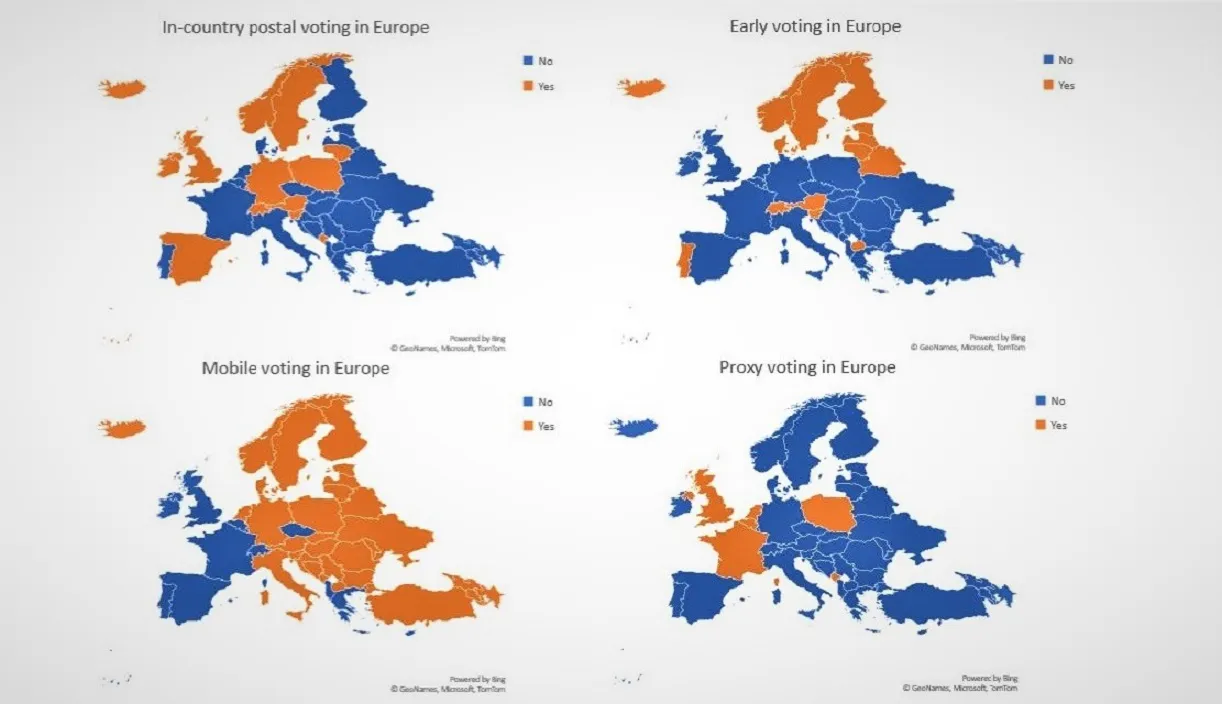Exchange of practices between European EMBs on special voting arrangements (SVAs)

Over the past months, the spread of COVID-19 has led many electoral management bodies (EMBs) in Europe and across the world to postpone elections to a later date. This period has also seen many governments and EMBs consider new or scaling up existing special voting arrangements such as early, postal and mobile voting in order to avoid crowded polling stations on an election day.
These developments have raised several questions for decision-makers and electoral assistance providers: how can credible elections be held safely during an unprecedented public health crisis? What are the current practices in special voting arrangements (SVAs) such as early, postal, mobile, and proxy voting? Can they be scaled up and applied for upcoming elections to mitigate risks of virus transmission? What challenges does their adaptation and application in a short time frame entail? And what can we learn from their previous use to apply them more consistently in order to make elections more inclusive and accessible for all voters?
To explore these questions, the International Institute for Democracy and Electoral Assistance (International IDEA) and the Permanent Electoral Authority of Romania convened an online roundtable titled "COVID-9 and Special Voting Arrangements (SVA): What can EMBs do to prepare for elections? "The objective of this online event was to share views among EMBs and election assistance providers in Europe on issues that they currently face in planning for electoral operations and on the use of various SVAs.
Over 80 representatives from EMBs, international election assistance agencies, and civil society representatives took part in the webinar. Electoral commissioners and other officials from Austria, Finland, Georgia, Lithuania, Moldova, Norway, Portugal and Switzerland contributed to the discussion with reports on ongoing situations and preparations on recent and upcoming elections.
Key reflections include:
- The context and the trust that citizens and electoral stakeholders have in electoral processes matter greatly in determining what options for SVAs are acceptable in a given country and what chances of success their application has to address COVID-19 related concerns;
- A large majority of countries across Europe currently have at least one of the four SVAs with a potential to avoid crowding out polling stations on elections day.
- Currently, 33 countries have provisions for voting through a mobile ballot box but a variety of conditions apply as to who is eligible. Eighteen countries have provisions for early voting, and 13 countries for postal voting, with special conditions applicable for the latter as well. Proxy voting is provided in seven countries.
- Early and postal voting can be most impactful in avoiding crowded polling stations, but introducing these requires significant changes to electoral procedures;
- Physical distancing and hygiene measures have gained increasing importance. Extending voting hours, opening additional polling stations, maintaining rigorous hygiene, allowing voters to bring in their own pens, transferring various pre-election registration procedures such as candidate and observer registration into an online mode, were cited as some of the new options already in place for upcoming elections or under consideration; and
- Significant alterations to electoral procedures that require amendments to electoral legislation are seen as challenging and difficult to secure in short time-frames. The necessary political consensus for electoral law amendments and the recommended principle of the stability of election law are the two primary considerations that shape this challenge.
This practitioner-driven discussion forms part of a series of guidance materials that International IDEA has developed within its COVID-19 and impact on democracy work. These materials aim to support countries in their decision making on preparing for elections in the context of the COVID-19 pandemic. These decisions should uphold standards of free and fair elections while at the same time ensuring the health of voters and election administrators.





